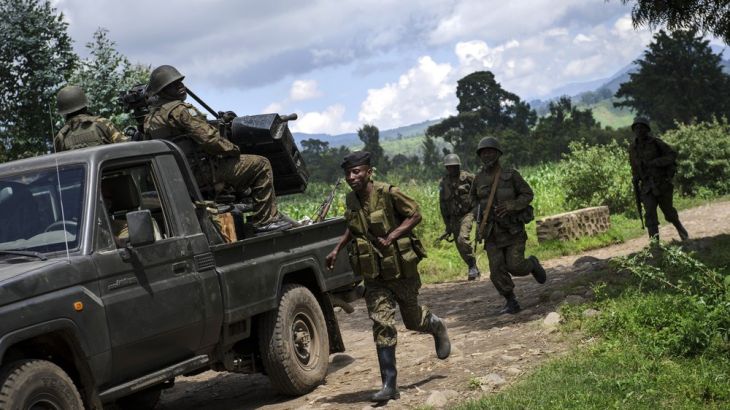Face to face with the rebels of DR Congo
During a lull in the fighting, Al Jazeera talks to Congolese rebel group M23 about their political goals.

Eastern DR Congo – For security reasons, it is not possible to go into great detail about how our team managed to cross into Eastern Congo’s rebel territory. I can say, however, that as we made our way through “no man’s land” – a quasi-buffer zone close to Congo’s border with Rwanda, we were well aware of the risks. On one side, the Congolese army, and a few kilometres away, rebels belonging to a group known as M23.
We waited for a lull in the fighting, a ceasefire to be called on humanitarian grounds. Our vehicle also had a press flag attached, which can be spotted from a distance.
This breathing period also allowed some civilians to return to their homes. Their farms are crucial to their livelihoods. However, most of the villages we passed were empty, many abandoned weeks ago.
| What is M23? |
|
– M23 was formed by Congolese rebels who were integrated into the national army in 2009, but who later defected – Many members of M23 are of Tutsi ethnicity – M23 is based in eastern Congo, near the Ugandan border – The group’s full name, the Movement for 23 March, refers to the date peace accords were signed in 2009 |
Once we were safely out of the danger zone, the rebels walked down from their position to meet us at the side of a road. They seemed very pleased to see us. Many journalists had made contact with them by telephone, but we were the first crew to meet them face to face, and they were extremely keen to tell us their story.
Organised and disciplined
What strikes you about the rebel group M23 is how organised and disciplined they are. Their Congolese army uniforms are clean; they seem happy and well-fed. This is not an army living in the depths of the jungle; they clearly have access to water, food, and medicine.
There are many questions about where the group’s support is coming from. There are unconfirmed reports that Rwanda is giving assistance. Former members of M23 who have returned to the national army have told journalists that Rwanda is providing weapons and ammunition.
Jason Stearns from the Rift Valley Institute says such allegations are very difficult to prove, but it makes sense, as “Rwanda has a lot of interests, economic and political, in the region”. The fact that M23 has been able to hold out for so long also suggests outside help.
The group itself denies this. Its spokesman, Colonel Vianney Kazarama told Al Jazeera: “We were very high up in the army. When we defected, we took with us many weapons and supplies.” He also insists that General Bosco Ntaganda, a man wanted by the International Criminal Court, is not with them.
But if he is not with them, where is he? “We do not know,” Kazarama replied. “We see him as a traitor to our cause.”
Unfortunately, we were unable to visit their base, which is located about a 5km trek across the hills, on top of a strategically important mountain named Mbuzi. So we could not verify any of their claims. Human Rights Watch has accused M23 of recruiting a number of child soldiers. Again, this is something we could not check.
A week ago, the M23 rebel group told me it was on the brink of taking various Congolese army positions, including Bunagana, on the Ugandan border.
Shifting politics
Now, the tone is far more conciliatory. Kazarama insisted that the group had “no intention of conquering any more territory in Congo. We defected from the army to demand the application of our agreement with the government”.
M23 is named after the peace agreement signed on March 23, 2009, in Goma. This agreement allowed the group known as the National Congress for the Defence of the People (CNDP) to transform into a political party, and integrate into the army. M23 says the government failed to honour that agreement, so it is now demanding political integration, and recognition of their officers’ ranks in the army.
It also wants the government to go after an armed group known by its French acronym, FDLR, or the Democratic Forces for the Liberation of Rwanda – which includes some of the perpetrators of the Rwandan genocide.
But M23 did not exist before the defection began in April. Their initial rebellion was over losing their privileged positions in Eastern Congo, and the arrest warrant issued for Bosco Ntaganda.
Now its demands have become very political.
Major John Nzenze is the only man in the group who speaks English. Holding a diary and taking notes, he told me he studied engineering at university. He said he was fighting so his family – who live in Northern Europe – can return safely to this region.
“Fighting is not good, even for us,” he said. “We want to live peacefully as others do in the world, but if we take the risk and fight in front of death, it means we really have a problem.”
There is a deeply ingrained culture of rebellion here. Peace agreements are not trusted means of ending conflict. This might not be a war yet, but could be soon, if the guns are not replaced with diplomacy.
